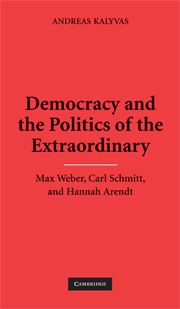Book contents
- Frontmatter
- Contents
- Acknowledgments
- List of Abbreviations
- Introduction: The Extraordinary and Political Theory
- I CHARISMATIC POLITICS AND THE SYMBOLIC FOUNDATIONS OF POWER
- II THE EXCEPTION AND CONSTITUTIONAL POLITICS
- III TAMING THE EXTRAORDINARY
- Conclusion: A Democratic Theory of the Extraordinary
- Bibliography
- Index
- References
Introduction: The Extraordinary and Political Theory
Published online by Cambridge University Press: 04 August 2010
- Frontmatter
- Contents
- Acknowledgments
- List of Abbreviations
- Introduction: The Extraordinary and Political Theory
- I CHARISMATIC POLITICS AND THE SYMBOLIC FOUNDATIONS OF POWER
- II THE EXCEPTION AND CONSTITUTIONAL POLITICS
- III TAMING THE EXTRAORDINARY
- Conclusion: A Democratic Theory of the Extraordinary
- Bibliography
- Index
- References
Summary
Although the modern age is often described as the age of democratic revolutions, the subject of popular foundings has not captured the imagination of modern political thought. Early democratic theory, marked by the historical experience of the ancient Greek polis and enraptured by the Roman republican legacy, at least since the time of Niccolò Machiavelli and Jean-Jacques Rousseau, has elided the theme of collective foundings and democratic higher lawmaking. By confining the question of new beginnings to the instituting acts of mythical lawgivers and heroic founders, usually located outside the demos, democratic theory did not systematically address political and legal foundings on its own terms.
Classical liberalism, meanwhile, has been inclined to emphasize juridical continuity, legality, and gradual political changes. Even in its social contract versions, with the prominent exception of John Locke, liberalism's focus has been more on a fictional natural state and the counterfactual notion of an original contract among equal and free persons and less on actual political ruptures, legal innovations, and new institutional beginnings. In fact, the idea of a social contract was predominantly used to explain political obligation, to justify obedience, to describe the consensual basis of authority, and, in a few cases, to legitimate resistance, rather than to account for those historical moments of genuine rupture and transformation. At a later stage, classical Marxism attempted to fill this gap by invoking the imminent possibility of a proletarian revolution, but its historical determinism and economic materialism has led Marxism to pay more attention to long-term social and economic mutations than to political, legal, institutional, and cultural changes, which were perceived as mere epiphenomenal effects of deeper structural developments unfolding in the realm of the material production of society.
- Type
- Chapter
- Information
- Democracy and the Politics of the ExtraordinaryMax Weber, Carl Schmitt, and Hannah Arendt, pp. 1 - 16Publisher: Cambridge University PressPrint publication year: 2008



